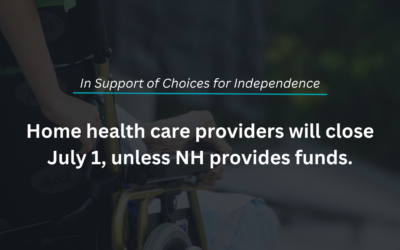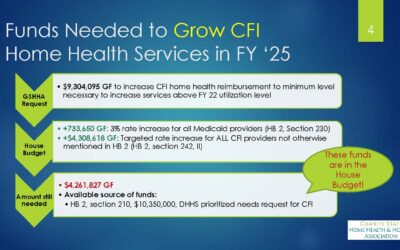Madeline Ullrich & Jena Rutter, NH Care Collaborative
$156,000 vs. $40,000. If you had to spend one, which would you pick? We have said it a million times and we will say it again: If the legislature wants to save money and make the fiscally conservative choice, it needs to fund Medicaid rate increases for the Choices for Independence Program (CFI). Keeping people in their homes is the cost-effective choice. It’s less expensive than continuous ambulance rides. It’s less expensive than sitting in an emergency department. And it’s far less expensive than nursing home care. One family shared that they paid $156,000 a year for nursing home-level care and then also paid around $40,000 for in-home care. But not only is funding CFI the fiscally responsible choice it also allows elderly and disabled individuals to remain in their homes and have choices about their care. Right now, neither is happening.
Unfortunately, the NH Care Collaborative Agency hears this far too often. It is frustrating for the CFI Care Coordinators who call daily, asking providers if they have any staff to fill even a few hours a day. Care Coordinators are repeatedly told the agencies just don’t have the staff. Some of that help may be as simple as having someone get some groceries, make a few meals, and do some light housekeeping. Other help can be more involved, with some individuals who are not able to transfer themselves and then end up being confined to a bed. It is absolutely heartbreaking for Care Coordinators when they must tell their clients that no one is available.
We have countless examples around the state of people who are going without the care they need. A young man living with Muscular Dystrophy; his condition, including sores/wounds on his back, became much, much worse because there was no caregiver available to turn him in his bed. He continues to need many more hours a week, but with these rates, it’s impossible to find caregivers. His wounds have now progressed to Osteomyelitis – infection in his bones.
I would like to challenge anyone reading this—would you prefer to live at a nursing home or remain living in your own home? The answer to this dilemma boils down to money. Home care providers can make more money working at McDonalds, Walmart…really anywhere. Our legislature has the power to increase the CFI rates—rates that have been underfunded by more than $153 million since 2011. It is my hope that our legislature will recognize that paying for home care providers is less expensive than paying for a nursing home.
The Senate Ways and Means Committee recently estimated State revenues at $184.3 million higher than House-Projected revenues. With this additional revenue the Senate should look at the Medicaid rates again to see if there is room for additional increases. At bare minimum, the Senate should not cut the $134.2 million the House put into their budget for Medicaid increases. Any cuts to the House increases will put many CFI programs in jeopardy of closing their doors. This would mean that not only are we not adequately funding CFI so we are paying more than we need to, but that individuals are not getting necessary care and are either dying in their homes without care or making a choice to forgo their comfort and freedom.


